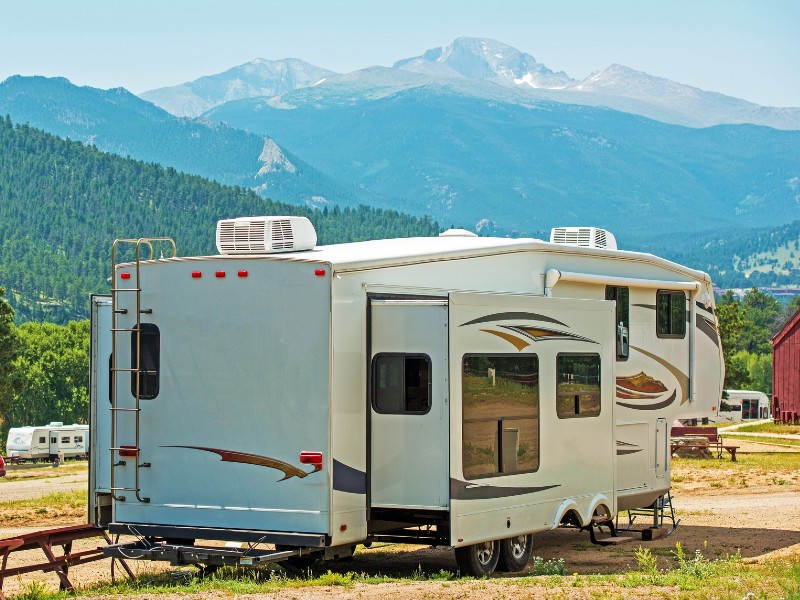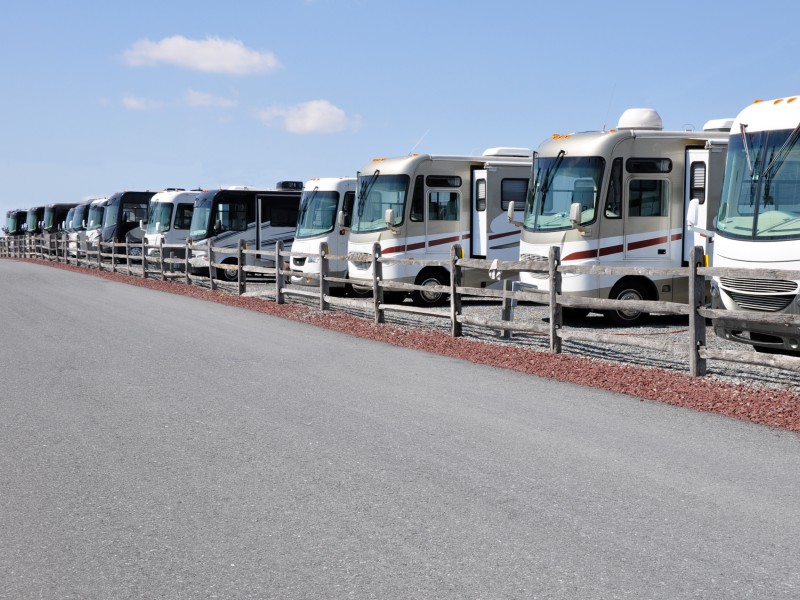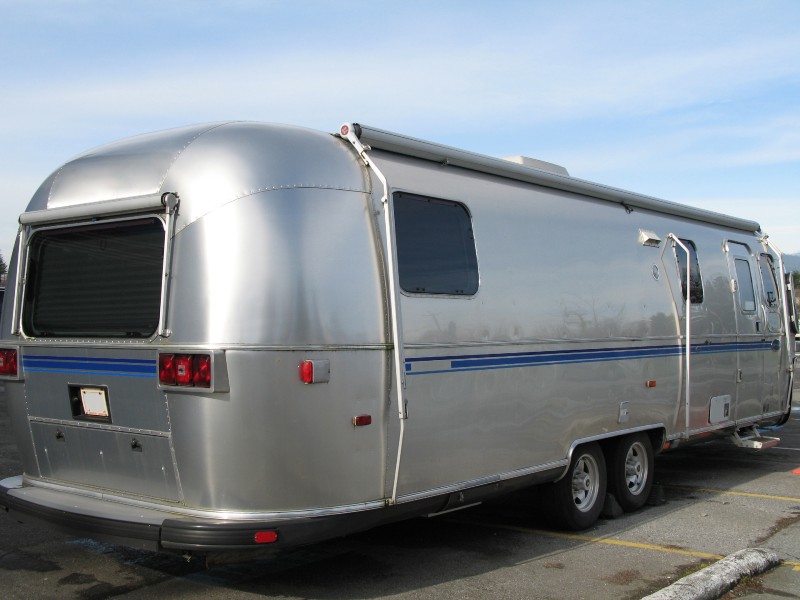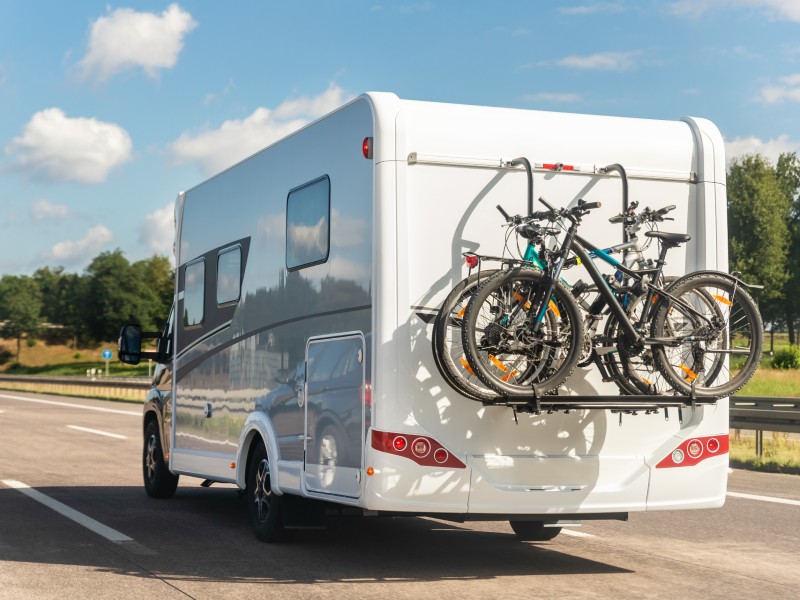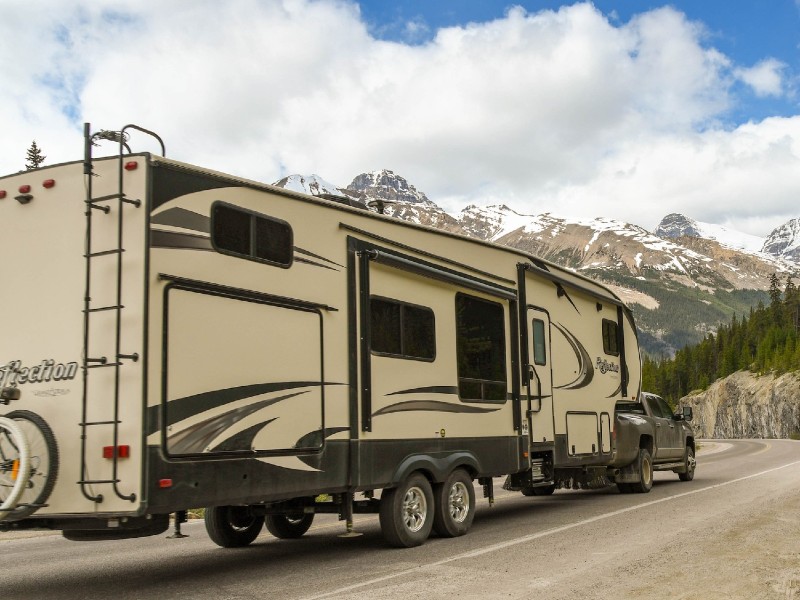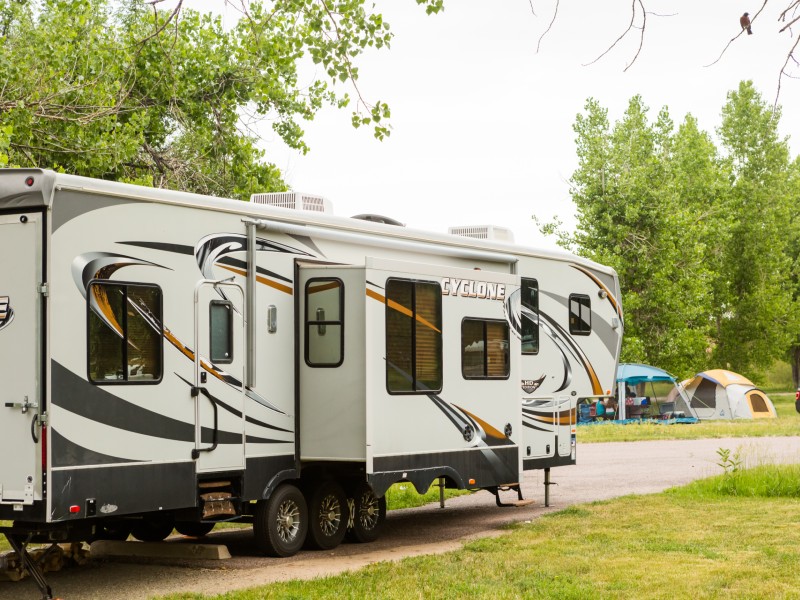If you love to camp, you probably have investigated a variety of RVs and campers. You know that there are two main types which are motorized and towable.
Motorized would be the Class A, Class B, and Class C motor homes. One type of towable is the Fifth-Wheel camper.
The one feature that distinguishes the fifth-wheel camper from every other size and type of RV and camper is the kind of hitch and the way it hooks to the vehicle towing it. The hitch of a fifth wheel is a gooseneck that connects to the bed of the towing vehicle.
This vehicle is typically a heavy-duty truck.
This type of gooseneck which hooks into the bed of a truck helps to provide better stability and center of gravity for the fifth wheel. If you have ever owned a travel trailer, you can understand the swaying back-and-forth issues that many owners experience.
Fifth-wheel owners do not complain about this issue, and some owners say they forget the fifth wheel is there because it is so easy to tow.
The one drawback of a fifth-wheel camper is that you must have a truck, and the truck must be heavy-duty to tow the heavier weight of a fifth-wheel.
When you are looking for tow-behind campers, it would be best if you stayed under the recommended maximum weight for your towing vehicle.
If you are looking for the most deluxe model of towable campers, a fifth wheel has to be at the top of most lists.
Being the most luxurious model also makes this camper the most expensive. However, you will enjoy a variety of amenities of a fifth wheel which can include:
• Bay window
• Appliances
• Crown molding
• Solid countertops
• Recliners- leather
• Pantry
• Microwave
• A TV with a DVD player
• Satellite radio
• Washer
• Dryer
• Safe
• Central Vac
• Grill
• Shower stall
• King Bed
When you are ready to purchase a fifth wheel, you need to consider three vital components, which include reasons for buying the unit, how the unit will be used, and the size of the unit.
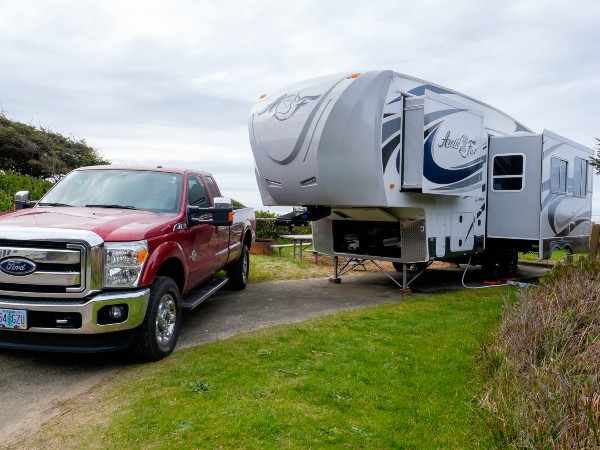
Reasons
Your reasons behind purchasing a fifth-wheel camper can be extremely critical when choosing a model size.
Do you plan to live in the camper? Are you using it every weekend? Will it be used only occasionally for camping a few times a year?
These questions are vital for a variety of essential reasons. First, if you plan to live in the unit, you will want to put more thought and consideration into comfort.
You will be in the unit every day, so comfort is essential to the quality of life and happiness.
Another consideration is durability. You will need to pay close attention to the fifth wheel’s longevity and the material used to make it.
When you use a camper every day, it has to endure wear and tear from this usage.
If you’re living in the unit, it’s also imperative to consider an all-seasons trailer to ensure comfort year around. When you do your research, you should find those companies that are known for their full-time use of fifth wheels.
However, these units tend to be heavier, and you will need a more substantial-duty truck. They are more durable and can handle full-time use.
On the other hand, if you plan to use your camper only occasionally, you are not as limited in options.
An excellent choice for an occasional fifth wheel use is a unit that is considered ‘lightweight.’ These campers are ½ ton towable, which means they will be fabulous for the casual weekend getaway.
If you plan to use your campers only on occasion, you might consider renting them out instead of paying for storage. This option would earn you some money while saving you storage fees.
Usage Plans
When you are researching a fifth-wheel camper, you must also consider the size and how you are going to use it. Some individuals plan to leave it stationary at a park or home, and others want to take it everywhere. Some choices may include:
- Going camping with a fifth wheel gives you a way to have a luxurious vacation in the woods. You can build a fire close and finish dinner, tell stories, and roast marshmallows. When you are finished, it is simple to take everything into the fifth wheel and clean in comfort instead of in a public area. It also allows you to sleep on a comfortable mattress while showering in private.
- Road trips You will love your next family road if you are using a fifth wheel. You can drive and see the country one city at a time without paying for hotels. You will also enjoy the comfort of your home away from home every night. You can skip eating out with a fifth wheel too by cooking in the unit. The best part is the trailer can be detached, and you can explore the area without hauling the unit around with you, eliminating the need for a rental car.
- Snow With a fifth wheel, you can drive to a sunny destination when it gets too cold. You can also drive to cooler weather when it gets too hot. You can enjoy both without worrying about seasonal lodging prices.
- Full-time You can also use the unit as a full-time home. This home can be parked in one spot or carried to a new location every week. You can visit family and friends while still having your personal space.
Regardless of how you will be using the fifth-wheel camper, you should consider the size and every aspect of the unit before purchasing it. The features and dimensions of the fifth wheel should match how you plan to use it.
You also should never trust a dealership because their goal is to sell you a unit. This goal may counteract your purpose of buying an appropriate unit.
Size
When it comes to fifth wheels, you have a variety of choices. These trailers are available in an array of lengths, starting from 22 feet and going to 40 feet.
The most commonly chosen sizes are 32, 34, and 36 feet.
Fifth-wheel campers also typically offer floor plans with slideouts. These slideouts are used to give you additional interior space.
Most manufacturers utilize the slideout advantage in the living room, dining room, or master bedroom areas.
Some companies will offer multiple slideouts in one unit. This practice is becoming most popular, where some fifth wheels come equipped with five or more slideouts.
It is vital to remember, however, that slideouts add weight to an already heavy camper.
Weight
The first consideration before purchasing a fifth-wheel trailer is how much weight your current vehicle can safely tow. You may want to buy a new truck as well as a new trailer.
Regardless, you must understand the weight limits of the vehicle.
Most people think finding this information is straightforward, but it is not as easy as some individuals believe. In order to understand, you must know about all of the different weights and acronyms needed to ensure safe towing.
Some tests that the vehicle should pass before you consider it for the fifth wheel include the following:
- The vehicle’s maximum trailer rating, which comes from the manufacturer, is higher than the trailer’s GVWR (Gross Vehicle Weight Rating), which is also from the manufacturer.
- The vehicle’s maximum payload is higher than the trailer tongue weight and the truck cargo.
- The vehicle’s reserve axle capacity minus the rear is higher than the trailer tongue weight plus the truck cargo.
These three tests will help to ensure your vehicle can handle the weight. Besides the above items, you should also consider the cargo carrying capacity (CCC).
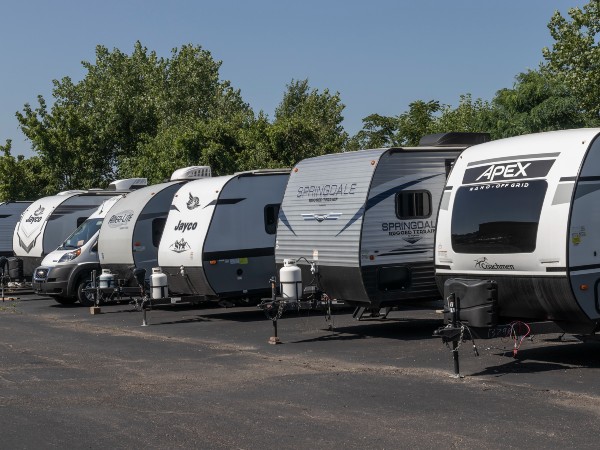
This capacity can be determined by using the following formula: the GVWR minus full fresh tank water weight minus full LP gas weight.
With the CCC, you can figure out the amount of weight that can be added to the trailer. You can find the above numbers on a sticker in the fifth wheel.
Length
When it comes to size, another aspect is the length of the unit. It is easy to get carried away when looking at your choices.
You will find that the more extended units have more features, which makes it easy to fall in love.
You can find units with fully equipped kitchen islands, living rooms with fireplaces, washers and dryers, king-size beds with a full closet, and many more features.
The issue is that each one of these features adds extra length to the fifth wheel.
You will hear a salesperson say it is only a few more feet and this fact may justify choosing to add the luxuries. However, these added luxuries may have a significant impact on your travel plans.
Towing becomes more difficult as the camper becomes longer.
Keep in mind that a wide array of parks and campgrounds utilize length restrictions.
These restrictions differ among the campsites and parks, but most national parks are unsuitable for big rigs.
Be careful not to go overboard with the length unless you plan to park the unit. The best option is to research your favorite campsites and see the restrictions associated with length.
Once you know, you can find a unit you are comfortable driving while sticking to these restrictions.
When discussing the size of an average fifth wheel, you can classify each one into one of four categories which include lightweight, mid-size, full-size or luxury, or toy hauler.
These categories are based on the overall length, weight, and height of the fifth wheel.
1. Lightweight Units
If you are looking for fuel savings, a lightweight size fifth-wheel camper may be your best option.
The top benefit of these units is the savings you will see when it comes to gas. With these savings, you will be able to tow the lighter vehicle further or spend more time at the destination.
With a lighter unit, you can also purchase a more affordable truck. With some of these fifth wheels, you only need a ½ ton pickup truck to tow the camper safely.
Some people associate lightweight with tiny and cramped, but this statement is not always true when it comes to fifth-wheel campers.
While it is true that these units may be more compact, many manufacturers offer a wide array of floor plans which can provide you with more spacious accommodations.
If the trailer is classified as lightweight, its length is typically up to 30 feet and weighs under 9,000 pounds.
If you are looking for a luxurious lightweight unit, an excellent choice would be the Scamp 19-foot Deluxe. This trailer is the largest of the Scamp brand and contains a queen-size loft bed.
It also can handle up to six people’s sleeping area.
This trailer also comes equipped with a wet-room bathroom, a kitchen area, and lots of storage room. The best part about this particular trailer is it only weighs between 2400 and 2900 pounds.
Other examples of lightweight fifth-wheel campers include the 6500-pound, 27-foot Allen 2690RETS Camper, the 3885-pound 21-foot Escape 5.9TA camper, and the 7460-pound, 29-foot Jayco Eagle HT 24.5CKTS trailer.
2. Mid-size Units
If you need much more space than a lightweight unit, you should investigate a mid-size fifth wheel which can give you from 30 to 40 feet in length.
However, these units weigh much more. The average weight is between 9000 and 14000 pounds for these campers.
These fifth wheels may require a 1-ton truck instead of the ½ ton. While a ½ ton truck could possibly handle these units, using a 1-ton truck to tow a mid-size fifth wheel will ensure the driver has more control and everyone has a smoother ride.
Unlike the lightweight units, the mid-size fifth wheel is likely to feature slide-outs which can provide more space, full-sized appliances, and expert countertops.
You can add to the weight of the mid-size camper by including ungraded furniture, bigger water tanks, and king-size beds.
An excellent example of a typical mid-size fifth-wheel camper is the Grand Design Reflection 337RLS. This trailer weighs 10570 pounds and is 35.6 feet long.
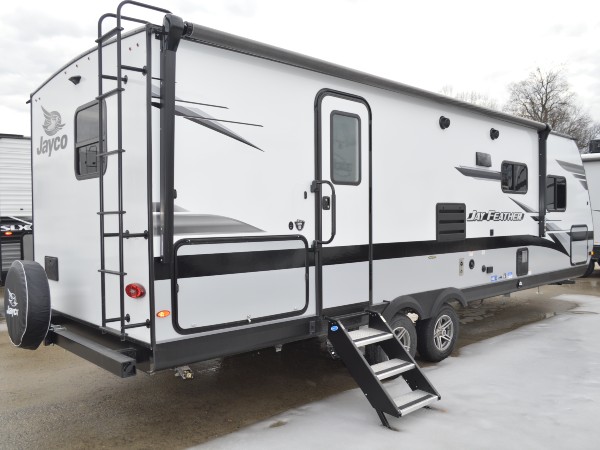
On the inside of this fifth wheel, it looks similar to a Class A motorhome.
It comes equipped with two slide-outs located near the rear of the unit. These slide-outs ensure you have plenty of room for your belongings and your family.
This unit also comes with a fireplace, dinette, full kitchen area, work surfaces, sink, and entertainment center located on the lower level.
The upper level contains the bedroom and the bathroom.
Some other examples of mid-size trailers include the Keystone Montana 3121RL, which weighs 11895 pounds and is 35 feet long; the Heartland Pioneer 355, which weighs 11010 pounds and is 39.8 feet long; and the Highland Ridge Mesa Ridge MF374BHS, which is 12300 pounds and is 40.6 feet.
Explore the Great Outdoors with Us!
3. Full Size or Luxury Units
If you are more of a glamper than a camper, you will appreciate the full-size or luxury category of the fifth wheel.
These fantastic units can be from 11,000 pounds at the lightest to 20,000 pounds at the heaviest. The length of these units can go up to 45 feet.
With this extra space, the full-size or luxury fifth wheel offers a variety of additional features, such as immersive entertainment options, higher ceilings, upgraded insulation, a massive master bedroom, and domestic appliances.
All of these fantastic features can help you forget you are in a fifth-wheel camper. An example of one of the most luxurious fifth wheels available is the DVR Elite Suites 44 Nashville.
This camper is also one of the heaviest campers also, weighing in at over 20,600 pounds.
It allows for a massive amount of extra space above the bed of the truck. This space could be used for a wide array of items, such as an indoor theater or seating for eight individuals.
This camper has a massive bathroom at the rear of the trailer with the kitchen and dinette slideouts in the middle section.
Some other examples of full-size or luxury fifth-wheel units are the 41-foot Redwood Cruiser CR3771MD weighing 12324 pounds, the 40-foot KZ Durango Gold weighing 13330 pounds, and the 42.8-foot Jayco Pinnacle weighing 13685 pounds.
4. Toy Hauler
The last category of fifth wheels is the toy hauler. This type and size of a wheel camper are excellent for those individuals who like to take a variety of toys on the road.
These toys could include ATVs, golf carts, motorbikes, or boats/kayaks.
This unique type of camper has a garage located at the back of the fifth wheel. This garage comes equipped with a ramp-style door which you can use to load and unload all of your toys quickly.
These trailers range in length from 33 feet to 45 feet, including the attached garage, and weigh approximately between 10000 and 16500 pounds.
It is important to remember that carrying ATVs or motorbikes in these units will make them significantly more substantial. One of the top brands of the toy hauler is Heartland which offers a wide range of options, including the Cyclone series.
One example of this series is the Cyclone 4005 toy hauler, which comes with a 13-foot garage, can sleep up to seven people, and weighs 16730 pounds without any extra toys. The length of this unit is 44 feet.
Some other examples of toy hauler fifth wheels include the Forest River 37TSX13 XLR Boost, which is 39.9 feet and 12687 pounds, Dutchman Voltage 3605, which is 39.1 feet and 13673 pounds, and Palomino Puma 381FTB, which is 39.2 feet and 14123 pounds.
Pros/Cons
Hopefully, the above information has helped you understand the size of an average fifth-wheel camper. As with any style and type of RV, camper, or travel trailer, you will see the pros and cons of a fifth wheel.
Pros
- The gooseneck allows for easy towing.
- A fifth wheel is spacious and roomy inside, which allows room for everyone when there is bad weather outside.
- The detachable fifth wheel leaves the towing vehicle free for excursions and trips around your camping area.
Cons
- A fifth-wheel camper requires a heavy-duty size towing vehicle equipped with a special package to hook to the gooseneck hitch.
- The inside of a fifth wheel contains a bi-level design that requires interior steps. These steps typically lead to the master bedroom located in the trailer section that covers the towing vehicle. If you do not like steps, you are probably better off with a travel trailer or motorized RV because all fifth wheels have this type of design.
- Being one of the most expensive towable campers, the fifth wheel’s price is definitely in the con column. A solution to this problem for entry-level buyers is to purchase a used fifth wheel because you can find deals on these road-tested campers.
- What are the unique features of a fifth-wheel camper that distinguish it from other types of RVs and campers?
Fifth-wheel campers are unique in their design, featuring a raised forward section that provides a spacious bi-level floor plan, and they are towed by a large pick-up truck via a special in-bed hitch, offering superior stability and maneuverability.
Unlike other RVs and campers, they often come with larger living spaces, including full-sized appliances and master suites, and their hitch design allows for easier and safer towing, especially for long-distance travels.
- What are the key considerations when deciding to purchase a fifth-wheel camper?
When deciding to purchase a fifth-wheel camper, the key considerations include the towing capacity of your vehicle, as the camper’s weight should be within this limit, and the camper’s size, layout, and amenities to ensure it meets your travel and comfort needs.
Additionally, consider the cost, including purchase price, insurance, maintenance, and operating costs, as well as the camper’s condition if it’s used, and the reputation of the manufacturer for quality and service.
- How does the size of a fifth-wheel camper impact its usability and the type of vehicle needed to tow it?
The size of a fifth-wheel camper directly impacts its usability by determining the amount of living and storage space available, with larger campers offering more amenities but potentially being more challenging to maneuver.
Additionally, the size and weight of the camper dictate the type of vehicle needed to tow it, with larger, heavier campers requiring more powerful vehicles, often a heavy-duty pickup truck, for safe and efficient towing.
- What are some of the amenities that can be found in a fifth-wheel camper?
A fifth-wheel camper typically offers amenities such as a fully equipped kitchen with a refrigerator, stove, and microwave, a bathroom with a shower, and sleeping areas that can include both beds and convertible sofas.
Additional amenities may include air conditioning and heating systems, entertainment systems with TV and stereo, ample storage space, and sometimes even laundry facilities or outdoor kitchens.
- How does the length of a fifth-wheel camper affect where it can be parked, such as in parks and campgrounds?
The length of a fifth-wheel camper can significantly impact where it can be parked, as many parks and campgrounds have specific size restrictions and may not accommodate larger vehicles.
Additionally, the maneuverability of longer campers can be challenging, limiting the ability to park in tighter spaces or navigate narrow roads commonly found in campgrounds and parks.
"Of all the paths you take in life, make sure a few of them are dirt."
-- John Muir
